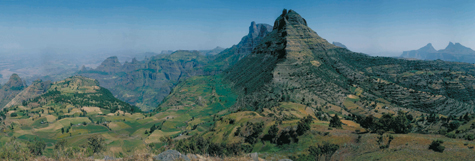
Completed PAMS Projects
Practicing soil and water conservation measures for food security in Gebezemariam Kebele, Ethiopia
Duration: December 2011 to May 2013
Executing Agency: Water and Land Resource Centre
Partners: CDE
In Ethiopia, soil and water conservation (SWC) measures have been implemented on farmlands since 1974 as a way of reducing land degradation. Despite the fairly long-term application of this approach in the region, a considerable amount of land has been degraded. At the project site, Melaka watershed, SWC measures have been practiced since the 1980s. However, most farmers dismantled the relevant SWC structures, believing them to be ineffective, putting large areas of land out of production. The main aim of this PAMS was to scale up the SWC measures that were successfully applied in Anjeni twenty years ago and are still in use. During the PAMS, nearly all household heads in Melaka were trained and 35 of them visited the Anjeni research site, where SWC measures have maintained and improved the livelihood of the community for decades. Consequently, the community gained knowledge on the construction of SWC measures and also on the importance of such measures to improve food security. The community constructed soil bunds (on about 95% of the cultivated land), trenches, and dams that they now actively maintain. The farmers’ increased awareness of SWC measures’ value as well as how to construct and maintain such measures were the key outcomes of the project.
Promoting a Soil Spectral Library Approach in Ethiopia to Assess the Impact of Soil Carbon Sequestration due to Sustainable Land Management (SLM) Systems
Duration: September 2011 to January 2013
Executing Agency: Amhara Region Agricultural Research Institute (ARARI), Ethiopia, National Soil Testing Centre (NSTC), Ethiopia
Partners: CDE
This PAMS promoted soil spectroscopy among policymakers, development practitioners, and smallholding farmers in Ethiopia. Land quality indicators are needed to evaluate the environmental impacts of land management practices and land use changes. The quantitative assessment of such indicators – such as soil nutrients, soil organic matter content, soil erosion, etc. – is often costly and cumbersome. But the long-term costs of rehabilitating degraded land could be much higher. Soil spectroscopy is a time- and cost-effective technology for monitoring soil quality and assessing the impacts of soil conservation and other management practices. In this PAMS, relevant stakeholders were trained and standardised procedures and manuals for Ethiopian labs working on soil spectroscopy were compiled. Six labs were equipped with instruments developed by the NCCR North-South that enable efficient spectral analysis in place of expensive wet chemistry procedures. Local staff were trained in the application of these instruments. Policymakers’ awareness of soil spectroscopy’s value was increased. Policymakers demonstrated their support by facilitating the acquisition and use of equipment for large-scale work in Ethiopia.
Sustained information and condom provision among the Borena community (Ethiopia)
Duration: January to October 2012
Executing Agency: GOAL Ethiopia
Partners: Swiss TPH
This PAMS built on the results of a previous project on HIV prevention in Borena (see below: "Community conversation for comprehensive HIV prevention in three weredas of Borena zone"). The community conversation approach was further developed and applied within the project. Community leaders’ roles were strengthened, and partnerships were established with local organisations to sustain community conversations in the future. Condoms were also distributed in the community.
Participatory Management of Chat (Catha Edulis Forskal) Residual /Garaba/ for Sustained Environmental Protection and Income Generation in the Town of Aweday, Ethiopia
Duration: February 2010 to November 2011
Executing Agencies: Department of Environmental Science, Haramaya University (DES/HU), Aweday Town Administration/Municipality, East Hararge Zone, Oromia Region, Ethiopia
Partners: CDE
This PAMS developed a low-cost, sustainable technique for managing and composting residues from the “Chat” plant, which is a major Ethiopian export commodity. The plant – which contains an amphetamine-like stimulant – is produced, marketed, and prepared for foreign export in Aweday, Ethiopia. One material by-product of Chat production, called Garaba, is an ever-increasing source of solid waste in the area. This PAMS helped to raise people’s awareness of the waste problem. A non-mechanised aerobic composting technique was also successfully tested. Finally, a formal house-to-house waste collection service was initiated for the first time in Aweday.
 Download publication: Generation, Composition and Characteristics of Urban Solid Waste in a Major Khat Producing and Marketing Area in Eastern Ethiopia(English / PDF 168 KB)
Download publication: Generation, Composition and Characteristics of Urban Solid Waste in a Major Khat Producing and Marketing Area in Eastern Ethiopia(English / PDF 168 KB)
Community conversation for comprehensive HIV prevention in three weredas of Borena zone
Duration: January to June 2009
Executing Agency: GOAL Ethiopia
Partners: Swiss TPH
Research showed that multiple sexual relationships in Borena were one of the major risks for HIV infection among the local people. Researchers organised community conversations with the aim of raising awareness on HIV/AIDS. In these conversations, participants identified key factors that make the community vulnerable to HIV infections, and discussed prevention mechanisms. This PAMS raised awareness about the health risk that comes with practicing multiple sexual relationships. Local people learned about the importance of HIV prevention measures, such as using condoms.
 Download Outcome Highlights (PDF / 721 KB)
Download Outcome Highlights (PDF / 721 KB)
Contact
For regional PAMS information:
Berhanu Debele, Regional Coordinator, Horn of Africa
For general PAMS information:
Eva Maria Heim, Coordinator of Partnership Actions